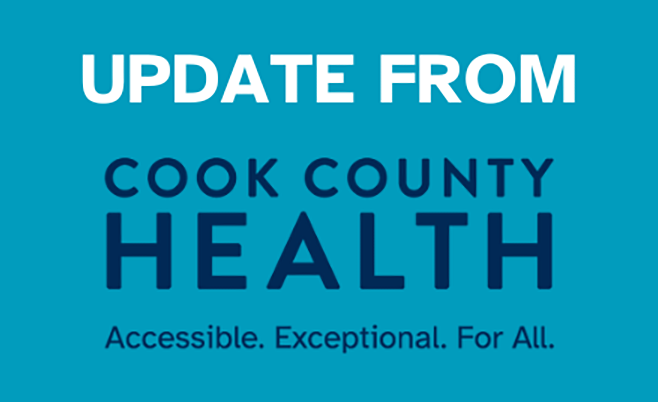Don’t just get by; take charge of your health. “Men avoid seeing the doctor when sick and put off checkups when well,” says Dr. Courtney Hollowell, men’s health expert and Chairman of Urology for the Cook County Health. According to Dr. Hollowell, this “if it’s not broke, don’t fix it” line of thinking results in men living sicker and dying younger than women. Dr. Hollowell offers these steps men can take today to improve their health and prevent problems down the road:
- Get regular checkups. Regular health exams and tests can help find problems early or before they start, when chances for treatment and cure are better. Few of us have ideal levels on all screening tests and this valuable information can put us in a position to begin making meaningful lifestyle changes. High cholesterol or increased weight, for example, may drive home the message that it’s time to change your diet and exercise.
- Get moving. Try to get 30 minutes of moderate physical activity on most days of the week. Up to 60% of Americans don’t get regular exercise and 25% are, to be blunt, couch potatoes. A pedometer can help remind us how much walking we’ve done over the day. The minimum daily goal should be 5,000 steps, but shoot for 10,000 steps for maximum benefit. Some studies suggest walking 30 minutes a day adds three years to your life, while physical inactivity doubles your risk of heart disease. But one thing is certain: any exercise is better than none, regardless of what time of day you do it. The best time for you to exercise is when it’s done consistently!
- Lose the belly. It’s important to maintain a healthy weight. Excess weight, especially around the waist, can have real health consequences. Grab a tape measure and put it around your body at the level of your belly button. A waist measurement of 40 inches or more in men and 35 inches or more in women doubles the risk for heart disease. In addition, so-called “abdominal obesity” greatly increases the risk for chronic diseases like type 2 diabetes, elevated cholesterol and premature death. Belly fat releases a toxic stream of fatty acids, inflammatory agents, and hormones that ultimately leads to health problems.
- Make sleep a priority. More than a third of Americans get less than the recommended amount of sleep. To get the most out of our sleep, both quantity and quality are important. Aim for a good seven to nine hours of shut-eye a night to allow your body to begin to repair cell damage, prime the immune system and consolidate memory. It takes discipline, but start by sticking to a sleep schedule and shutting off all electronic devices a half-hour before bed. Not only does the light from a TV or computer suppress melatonin, a hormone that controls our sleep-wake cycle, but many programs are stimulating rather than relaxing. Sleep-deprived men report worsening libido and increased appetite, leading to unnecessary weight gain.
- Kick the habit. Smoking has been found to harm nearly every organ in the body. Although everyone knows it’s bad for you, there are still over 40 million current smokers in the United States. In addition to being the leading cause of cancer and death from cancer, it also causes bronchitis, emphysema, diabetes, osteoporosis, rheumatoid arthritis, age-related macular degeneration and cataracts – just to name a few . Men should also be aware of the fact that smokers are twice as likely to develop erectile dysfunction compared to non-smokers. So if you want to prevent these types of issues or improve the problems you already have, take that cigarette and throw it away. Your doctor can help you with your quit attempt.
For more tips, listen to Dr. Hollowell’s interview with WVON’s Art “Chat Daddy” Sims below!

